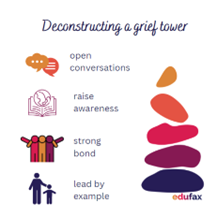Did you know that moving implies loss, one of the most stressful events in life? Therefore, it generates feelings of grief.
Grief inducing experiences
Many life experiences can produce feelings of grief in a child, from the death of a relative or a divorce in the family to more everyday experiences such as moving to a new neighbourhood or losing a prized possession (J. W. James & R. Friedman, 2002).
Grief results from any change in familiar behaviour patterns because it implies a loss. Whenever we move, it involves change! It is not only a change in the actual physical home but a change in familiar habits and routines. The changes could add up to an overwhelming list, which impacts everyone, both adults and children (Gilbert, K.R. 2008).

But why can moving be so stressful?
Teenagers, as well as adults, are confronted with numerous losses. These can be categorized into ‘obvious losses’ and ‘hidden losses’, which often get stacked onto each other, creating a grief tower. Obvious losses are leaving behind your school, friends, family members, home, pets, and toys, while hidden losses are the sublayers of the obvious losses: loss of being known, loss of things that brings you comfort, loss of praise for as skill or hobby, loss of climate, loss of belonging, loss of familiar tastes and smells. Thus, we lose touch with what is most familiar.

Why is that more crucial when it comes to teenagers?
A major task during teen hood is the quest to define oneself. What are my likes and dislikes? What am I good at? What are my values and beliefs? Inevitably, as it does with everyone, a loss will impact how teenagers define themselves in the present and future.
Self-identity forms the basis of our self-esteem. In the 1960s, psychologist Erik Erikson argued that the key to developing a secure identity lies within the adolescent’s interaction with others. Children’s unique characteristics, family dynamics, the culture they are surrounded by, their interaction with peers, and social media play a significant role in forming their identity. Consequently, the way we define ourselves shapes our perceptions of belonging. (Upreti, R. 2017; Adolescent identity development, n.d.)
Inevitably, even if teens appear to have a strong sense of self, sudden changes — moving to a new country, loss of a loved one, changes in family structure — can leave them feeling like they must reinvent themselves (Williams, J. 2018).
What about globally mobile children, the so-called: ‘Third Culture Kids’ (TCK’s)?
Children who experience mobility during their formative years are more prone to social and emotional related struggles than monocultural children due to their ever-changing surroundings and people in their lives. They are marked by a particular shared disorientation and the sense that home is “everywhere and nowhere” at once. However, keeping it in perspective, in most cases, TCKs agree that the pros far outweigh the cons of an internationally mobile childhood (C.J, Hartman. 2022). TCK teens are resilient, resourceful, creative, and flexible. Nevertheless, what often hinders their resilient side is the assumption that those emotional fluctuations will ‘go away automatically’ or the lack of awareness of the grief-inducing nature of moving, which might result in unresolved grief and a sense of lack of belonging.

What’s your role as a parent in this?
Resolving this grief is essential in the healthy development of teenagers’ self-identity. That will help turn the challenges into valuable life skills. Following the ‘laws of emotions,’ acknowledging and accepting are keys to healing and building resilience. Acknowledging and accepting all negative and positive emotions that arise in the transition, encouraging self-expression, showing understanding, and being available to listen to them are the most fruitful approaches a parent use to help teenagers redefine themselves and reap the benefits of this experience.
Here are some tips that might be of help to parents in this process:
Recognition: Invite them to articulate what they have lost and allow them to express how that makes them feel. Recognize that the expression may come out in one of the grief cycle stages.
Acceptance: allow the third culture teen to express their grief by journaling, talking it through, or creating something that represents their grief.
Affirmation: affirm their resilience and draw upon their strengths in how they have transitioned before and can do it again.
Relatedness: Finding community members who share a similar upbringing can provide space to tell stories without the teen fearing that they are “bragging” or are misunderstood by monocultural peers.
Gratitude: cultivating a space of gratitude can also serve as an anchor of stability to help third culture teens identify and appreciate the blessings in their life and turn their challenges into power (Norton, M. 2020).
Knowledge and research
Over the years, Edufax compiled a team of dedicated educational and pedagogical professionals who strive to develop their knowledge and skills on the well-being of children. With decades-long experience in supporting relocating families, they continue to expand their expertise without boundaries. Whether it is a question about educational mobility or concerns about your child’s well-being – Edufax is there to listen and support you.





